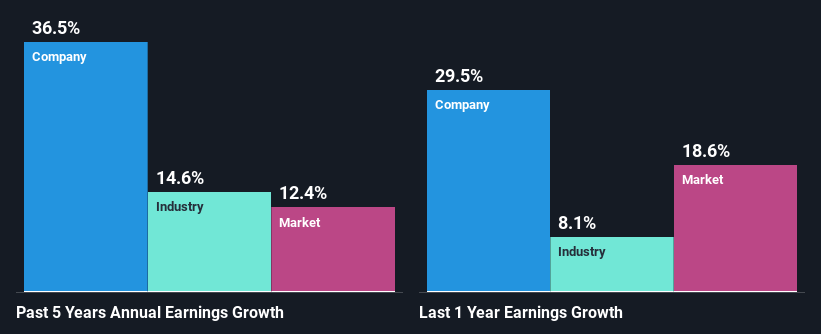Stock Analysis
- Austria
- /
- Electric Utilities
- /
- WBAG:VER
Is VERBUND AG's (VIE:VER) Recent Stock Performance Tethered To Its Strong Fundamentals?

VERBUND (VIE:VER) has had a great run on the share market with its stock up by a significant 16% over the last three months. Given that the market rewards strong financials in the long-term, we wonder if that is the case in this instance. Specifically, we decided to study VERBUND's ROE in this article.
Return on equity or ROE is a key measure used to assess how efficiently a company's management is utilizing the company's capital. Simply put, it is used to assess the profitability of a company in relation to its equity capital.
View our latest analysis for VERBUND
How To Calculate Return On Equity?
ROE can be calculated by using the formula:
Return on Equity = Net Profit (from continuing operations) ÷ Shareholders' Equity
So, based on the above formula, the ROE for VERBUND is:
22% = €2.7b ÷ €12b (Based on the trailing twelve months to March 2024).
The 'return' is the yearly profit. So, this means that for every €1 of its shareholder's investments, the company generates a profit of €0.22.
What Is The Relationship Between ROE And Earnings Growth?
Thus far, we have learned that ROE measures how efficiently a company is generating its profits. Based on how much of its profits the company chooses to reinvest or "retain", we are then able to evaluate a company's future ability to generate profits. Assuming everything else remains unchanged, the higher the ROE and profit retention, the higher the growth rate of a company compared to companies that don't necessarily bear these characteristics.
VERBUND's Earnings Growth And 22% ROE
Firstly, we acknowledge that VERBUND has a significantly high ROE. Second, a comparison with the average ROE reported by the industry of 10% also doesn't go unnoticed by us. As a result, VERBUND's exceptional 37% net income growth seen over the past five years, doesn't come as a surprise.
We then compared VERBUND's net income growth with the industry and we're pleased to see that the company's growth figure is higher when compared with the industry which has a growth rate of 15% in the same 5-year period.

Earnings growth is a huge factor in stock valuation. The investor should try to establish if the expected growth or decline in earnings, whichever the case may be, is priced in. By doing so, they will have an idea if the stock is headed into clear blue waters or if swampy waters await. Is VERBUND fairly valued compared to other companies? These 3 valuation measures might help you decide.
Is VERBUND Making Efficient Use Of Its Profits?
VERBUND has a three-year median payout ratio of 40% (where it is retaining 60% of its income) which is not too low or not too high. This suggests that its dividend is well covered, and given the high growth we discussed above, it looks like VERBUND is reinvesting its earnings efficiently.
Besides, VERBUND has been paying dividends for at least ten years or more. This shows that the company is committed to sharing profits with its shareholders. Our latest analyst data shows that the future payout ratio of the company is expected to rise to 54% over the next three years. Therefore, the expected rise in the payout ratio explains why the company's ROE is expected to decline to 10.0% over the same period.
Conclusion
On the whole, we feel that VERBUND's performance has been quite good. In particular, it's great to see that the company is investing heavily into its business and along with a high rate of return, that has resulted in a sizeable growth in its earnings. With that said, on studying the latest analyst forecasts, we found that while the company has seen growth in its past earnings, analysts expect its future earnings to shrink. To know more about the latest analysts predictions for the company, check out this visualization of analyst forecasts for the company.
Valuation is complex, but we're helping make it simple.
Find out whether VERBUND is potentially over or undervalued by checking out our comprehensive analysis, which includes fair value estimates, risks and warnings, dividends, insider transactions and financial health.
View the Free AnalysisHave feedback on this article? Concerned about the content? Get in touch with us directly. Alternatively, email editorial-team (at) simplywallst.com.
This article by Simply Wall St is general in nature. We provide commentary based on historical data and analyst forecasts only using an unbiased methodology and our articles are not intended to be financial advice. It does not constitute a recommendation to buy or sell any stock, and does not take account of your objectives, or your financial situation. We aim to bring you long-term focused analysis driven by fundamental data. Note that our analysis may not factor in the latest price-sensitive company announcements or qualitative material. Simply Wall St has no position in any stocks mentioned.
About WBAG:VER
VERBUND
Generates, trades, and sells electricity to energy exchange markets, traders, electric utilities and industrial companies, and households and commercial customers.
Solid track record with excellent balance sheet and pays a dividend.

